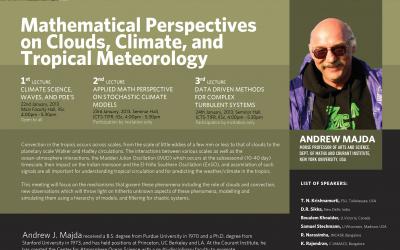Lecture 1: Climate Science, Waves, and PDE’s for the Tropics: Observations, Theory, and Numerics
Abstract:
Geophysical flows are a rich source of novel problems for applied mathematics and the contemporary theory of partial differential equations. The reason for this is that many physically important geophysical flows involve complex nonlinear interaction over multi-scales in both time and space so developing simplified reduced models which are simpler yet capture key physical phenomena is of central importance. In mid-latitudes, the fact that the rotational Coriolis terms are bounded away from zero leads to a strict temporal frequency scale separation between slow potential vorticity dynamics and fast gravity waves; this physical fact leads to new theorems justifying the quasi-geostrophic midlatitude dynamics even with general unbalanced initial data for both rapidly rotating shallow water equations and completely stratified flows.
At the equator, the tangential projection of the Coriolis force from rotation vanishes identically so that there is no longer a time scale separation between potential vortical flows and gravity waves. This has profound consequences physically that allow the tropics to behave as a waveguide with extremely warm surface temperatures. The resulting behavior profoundly influences longer term mid-latitude weather prediction and climate change through hurricanes, monsoons, El Nino, and global teleconnections with the mid-latitude atmosphere. How this happens through detailed physical mechanisms is one of the most important contemporary problems in the atmosphere-ocean science community with a central role played by nonlinear interactive heating involving the interaction of clouds, moisture, and convection. The variable coefficient degeneracy of the Coriolis term at the equator alluded to earlier leads to both important new physical effects as well as fascinating new mathematical phenomena and PDE’s. In this equatorial context, new multi-scale reduced dynamical PDE models are even relatively recent in origin.
After a brief discussion of the observational record as background, this lecturer surveys the remarkable new hyperbolic systems that have emerged recently in applications including their physical properties, applied mathematical and rigorous mathematical theory. These last topics include novel relaxation limits for climate models with active moisture and new singular limits for hyperbolic PDE’s with variable coefficients. All of the references in this lecture can be found at http://www.math.nyu.edu/faculty/majda/.
Date: January 22, 2013
Time: 4:00pm - 5:30pm
Vanue: Main Faculty Hall, IISc
(Open to all)
Lecture 2: Applied Math Perspectives on Stochastic Climate Models
Abstract:
We are entering a new era of Stochastic Climate Modeling. Such an approach is needed for several reasons: 1) to model crucial poorly represented processes in contemporary comprehensive computer models such as intermittent organized tropical convention in the atmosphere and mesoscale/submesoscale eddies in the ocean; 2) to quantify uncertainty in intermediate and long rang forecasts where both uncertainty in initial data and forcing play a role 3) to represent unresolved stochastic backscatter from small scales to large scales in midlatitude dynamics. This lecture has three parts which illustrate how contemporary applied mathematics contributes novel stochastic ideas and potentially practical algorithms for these important problems. The use of judicious simplified but complex mathematical models for turbulent dynamical systems will be emphasized throughout the lecture. The first topic is joint work with Boualem Khouider and Yevgeniy Frenkel, the second topic with Themis Sapsis, and the third topic with Ian Grooms. All of the references in this lecture can be found at http://www.math.nyu.edu/faculty/majda/.
Date: January 23, 2013
Time: 4:00pm - 5:30pm
Vanue: Seminar Hall, ICTS-TIFR, IISc
(Participation by Invitation only)
Lecture 3: Data Driven Methods for Complex Turbulent Systems
Abstract:
An important contemporary research topic is the development of physics constrained data driven methods for complex, large-dimensional turbulent systems such as the equations for climate change science. Three new approaches to various aspects of this topic are emphasized here: 1) the systematic development of physics constrained quadratic regression models with memory for low frequency components of complex systems; 2) Novel dynamic stochastic superresolution algorithms for real time filtering of turbulent systems; 3) New nonlinear Laplacian Spectral Analysis (NLSA) algorithms for large dimensional time series which capture both intermittency and low frequency variability unlike conventional EOF or principal component analysis. This is joint work with John Harlim (1, 2), Michal Branicki (2), and Dimitri Giannakis (3). Examples will include dynamic stochastic superresolution (DSS) for the mesoscale eddy heat flux from coarse satellite altimetry measurements and low frequency and intermittent modes in SST form 800 year runs of CCM. All of the references in this lecture can be found at http://www.math.nyu.edu/faculty/majda/.
Date: January 24, 2013
Time: 4:00pm - 5:30pm
Vanue: Seminar Hall, ICTS-TIFR, IISc
(Participation by Invitation only)
The following activities have also been organized around these lectures


